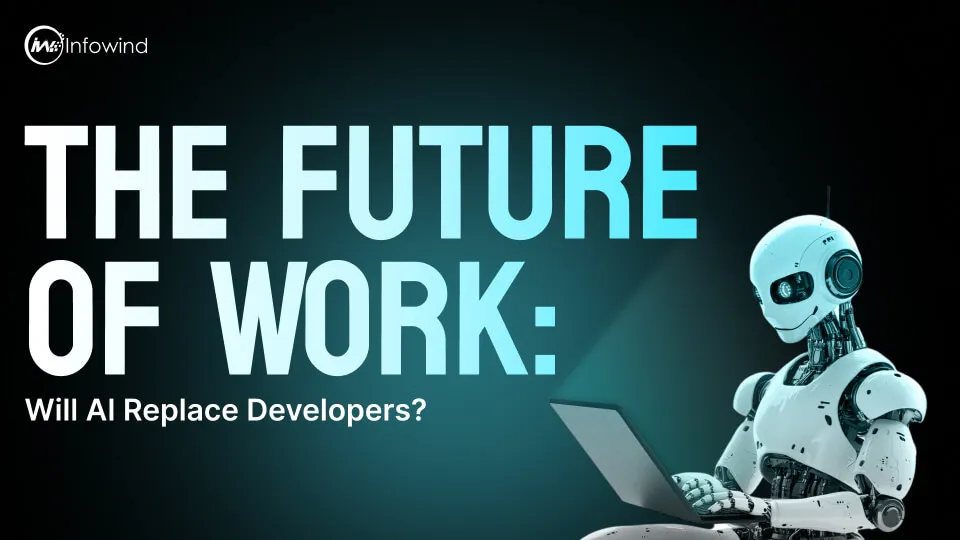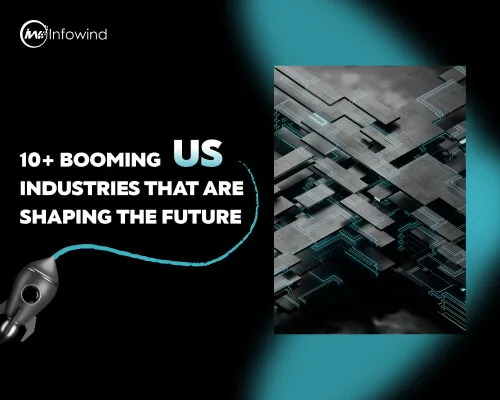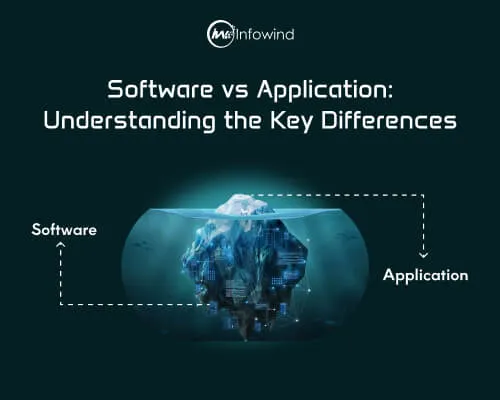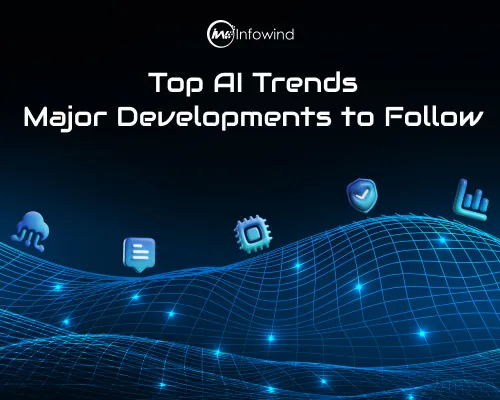With the advancements in the software development industry, the rise of AI has brought a different wave to the ecosystem. There are now numerous generative AI tools available on the market that have transformed how developers write and interact with code. Tools like GitHub, Copilot, ChatGPT, and Amazon CodeWhisper have evolved the capabilities of developers to refine their problems. These AI tools write the code, debug the errors, or suggest improvements to the developers.
Equipping the AI tools for the software developers, a question arises: Will AI replace the software developers by 2030? So let’s find out if it is true. These AI software will not totally replace the developers, but they have refined their responsibilities and capabilities and provide an improved output that reduces their manual coding time.
Of course, their roles have been redefined, and the skill set is now accompanied by these tools, making it easier for them to continue their workflow in software development. However, AI replacing developers totally is just next to impossible because there are a lot of tasks or complex problems that require the developers and a human brain to solve.
The automation of tasks has reduced the redundancy of work with AI tools for developers. But the critical thinking and creativity that are required to solve the unique problems are something that AI can never replace.
Although the developers benefit from these AI tools, the evolution of AI has brought new opportunities that optimise these processes with the help of generative AI, improving productivity. So let’s discover in this blog how AI vs human coders will change the software development ecosystem and its impact on the developers.
Evolution of AI in Software Development
With the advancements in artificial intelligence, the software development ecosystem has been reshaped, and most developers have mastered the use of GitHub Copilot or other chatbot assistants in their day-to-day lives for software development workflows. But still, there’s a lot of scope to integrate these AI to redefine the software development services. The automation of tasks with AI coding assistance has led to a transformation in the industry. It has raised the question, Will developers be replaced by AI?
The AI evolution journey is backed by LLM, large language models that learn from the data, and then adopt deep learning to transform the complex patterns. By utilising the data sets to create an LLM that understands and generates human-like text and code. Earlier, there was an adoption of a rule-based system in AI, which meant that the AI systems were built upon pre-programmed rules and logics.
The systems perform the tasks based on those rules or the set of instructions. But then they were unable to adapt to the new and rigid situations that required manual programming for other scenarios. And so it has evolved the machine learning and deep learning concepts. With both these breakthroughs, AI was enabled to perform tasks based on the data rather than being programmed for each task independently. The system can now predict based on the data and make decisions without any detailed rules for every task.
The release of AI applications like GitHub Copilot and Amazon CodeWhisperer has now reduced the gap between the human brain and machine execution, and they are used in documentation, test generation, coding, and many other everyday tasks. An engineering director in a tech firm quotes
“AI is not replacing the developer. If you master AI, then it will take you to the next level and amplify your progress to reduce worktime.”
This major shift from manual coding to the use of AI assistance for software development has evolved this industry.
Also Read: Mobile App Developer Salary in India
What AI Can Do (and Can’t Do) in Coding Today
AI can be considered a powerful tool in today’s modern world. It is a human companion in the software development process, which eases the task of the developers. Its major strength lies in performing automated repetitive tasks based on a pattern, and tools like LLM have been training models using data, which provides a strong foundation for AI functionality. While it can solve numerous problems in the software development ecosystem, there are still a few limitations to the AI ecosystem today.
Strengths
- Code autocompletion: AI tools excel at providing intelligent code suggestions, completing lines of code, and predicting the next logical elements, significantly speeding up the development process.
- Boilerplate generation: AI can quickly generate repetitive code structures, common functions, and project setup files, reducing manual effort and ensuring consistency.
- Test case generation: AI can assist in creating unit tests and integration tests by analyzing code and suggesting relevant test scenarios and inputs.
- Refactoring suggestions: AI tools can identify areas for code improvement, suggesting refactoring opportunities to enhance readability, maintainability, and performance.
Limitations
- Understanding business context: AI cannot fully grasp complex business requirements, strategic goals, and the nuanced implications of technical decisions on the overall business.
- Designing scalable architectures: While AI can generate code, it cannot independently design robust, scalable, and maintainable software architectures that align with long-term vision and evolving needs.
- Ethical and security decisions: AI cannot make informed ethical judgments or navigate complex security considerations, which require human judgment and understanding of potential societal impacts.
- Debugging non-obvious logic errors: While AI can identify and fix many errors, debugging intricate or subtle logical flaws that require a deep understanding of the system’s intent and behavior remains a human domain.
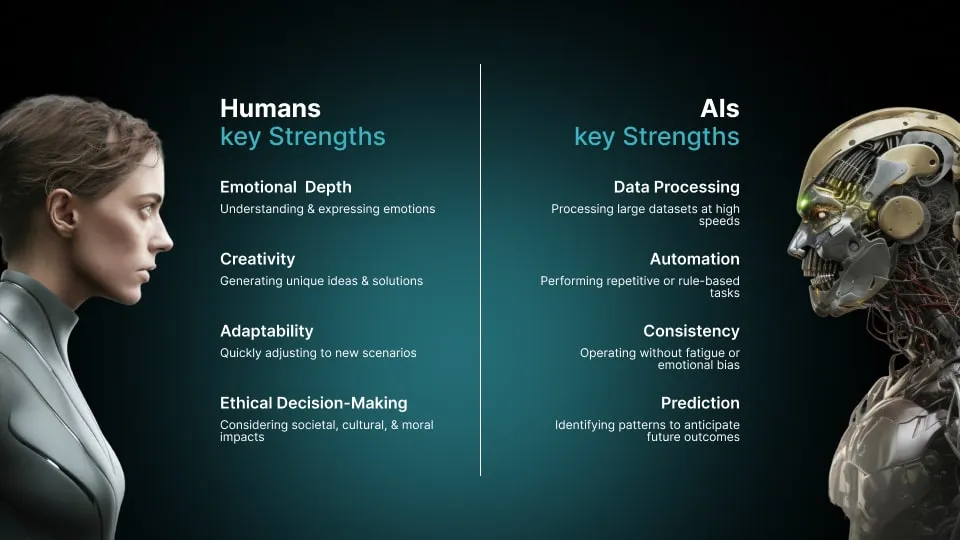
Will Developers Be Replaced by AI by 2030? A Realistic Scenario Analysis
The rise of AI-assisted coding tools has led many to ask Will developers be replaced by AI by 2030? The short answer: No, AI replacing developers is not 100% possible, but their roles will evolve significantly.
What Will Change
- AI pair programming and advanced assistants will be standard, taking over boilerplate tasks like code generation, bug fixing, and documentation.
- Developers will spend less time on mundane tasks and more on architectural decisions, user experience, and addressing domain-specific challenges.
- Productivity per developer will increase as AI-driven tools speed up prototyping, code reviews, and maintenance.
- The rise of hybrid roles, such as AI product managers and cloud-native architects, will require a mix of traditional engineering and AI expertise.
What Won’t Change
- Critical thinking, creativity, ethical reasoning, communication, and empathy are irreplaceable human qualities that remain core to engineering roles.
- Full-stack expertise, system architecture, and security leadership still demand judgment, experience, and holistic awareness that AI cannot replicate.
- Developers will continue to be needed for auditing, directing, and refining AI outputs to maintain business alignment and ethical standards.
New Roles Likely to Emerge
- AI Model Trainer: Engineers specializing in developing, customizing, and maintaining AI systems for developer tasks.
- Prompt Engineer: Specialists who design effective prompts to guide AI models in generating code or documentation
- Code Validator / AI Code Reviewer: Professionals ensuring AI-generated code meets quality, security, and compliance standards.
- AI-Ops Specialist: Developers orchestrating AI-driven infrastructure management and monitoring.
In summary, the core developer role will evolve—not disappear—by 2030, with most human skills remaining essential and new, AI-centric roles becoming vital within tech teams.
Developer Jobs Outlook (2026–2030)
In spite of automation concerns, international demand for software developers continues strong, and is expected to rise steadily up to 2030. According to the U.S. Bureau of Labor Statistics (BLS), jobs for software developers, quality assurance analysts, and testers will grow 25% between 2022 and 2032, a significantly higher rate than for all occupations. That equates to over 400,000 new U.S. jobs alone.
Likewise, the Future of Jobs Report (2023) from the World Economic Forum lists AI and machine learning experts, software developers, and cybersecurity experts as among the most rapidly growing jobs globally. Although AI vs human coders is a big competition, AI will do repetitive coding, and it will also introduce new demands on the developer for expertise in AI model integration, ethical regulation, and system scaling.
Emerging Areas of Growth
- AI & Machine Learning Engineering: Increasingly, engineers will build, evolve, and implement intelligent systems, putting models into applications and platforms.
- Cybersecurity: With AI and automation driving increasing attack surfaces, the need for secure architecture and ethical controls will skyrocket exponentially.
- MLOps & DevOps Automation: Companies will look for engineers who can automate pipelines, handle hybrid infrastructures, and deliver system reliability.
- Automation Orchestration: Builders will orchestrate multi-AI systems, APIs, and tools to build frictionless workflows throughout enterprise landscapes.
Even GitHub’s 2024 Developer Report discovered that more than 92% of developers are already using AI-powered coding tools, and instead of cutting staff, teams have higher productivity, accelerated releases, and less burnout. This indicates that AI enhances developer capability and does not replace it.
How Developers Can Future-Proof Their Careers
While AI revolutionizes the software field, the greatest developers will not be those fighting against automation, but those harnessing it for themselves. To choose between AI vs developers, let’s see how it can be achieved simultaneously. The code of the future is collaboration between human creativity and machine speed. To thrive, developers need to develop skills that will supplement AI, not substitute for it.
1. Welcome AI Tools as Productivity Partners
Cutting-edge AI tools like GitHub Copilot, ChatGPT, and Replit Ghostwriter are not developers’ replacements; they’re co-pilots that accelerate work. Familiarize yourself with integrating these assistants into your daily workflow for faster debugging, better documentation, and rapid prototyping. Leverage AI as a cognitive process augmentation, freeing up time for higher-order thinking and creativity.
2. Upskill in System Design, AI Ethics, and Domain Knowledge
The future of AI vs developers will have to go beyond coding. System design, scalability, and AI for ethics governance will be crucial skills. Knowing how algorithms affect fairness, privacy, and transparency will make professionals stand out. And specialize in domain-specific coding, fintech, healthtech, or cybersecurity, where context awareness still requires human decision-making
3. Focus on Soft Skills
As technical work rises with AI, human skills will be the hallmark of leadership. Communication, collaboration, and problem-solving competencies will prove useful in guiding AI-powered projects. Cross-functional teams’ capacity to communicate, educate, and collaborate will be in great demand in bridging business and technical objectives.
4. Stay Adaptive: Practice Lifelong Learning
Technology will evolve faster than ever before, and constant experimentation is the only workable strategy. Pick up new languages, frameworks, and tools regularly. Participate in hackathons, open-source projects, and forums on AI ethics to keep yourself in the fray. Developing a personal habit of curiosity will help you adapt as the landscape changes.
The Takeaway
AI is transforming how development occurs, but not making the developer unnecessary. By adopting AI as a partner, putting a premium on deep technical and ethical skill, and developing innovative and interpersonal competence, developers can construct robust, future-proofed careers that influence the way technology develops rather than developing in response to it.
Final Insights: The Human Touch in the Age of AI
Artificial intelligence has already demonstrated it can produce code, detect bugs, and improve performance with a velocity formerly unimaginable. The single thing it can’t yet imitate, however, is human intuition that goes into magnificent software, the empathy, creativity, and ethical awareness that transform lines of code into products that actually improve people’s lives.
As AI continues to automate the “how” of code, it will be up to developers to determine the “why” and the “what.” The finest engineers of the next ten years won’t be competing with machines; instead, they’ll be collaborating with them, using AI to enhance productivity, refine ideas, and accelerate innovation.
Even as calculators never replaced mathematicians, AI will not displace developers either. It will merely redefine what development means from syntax and manual labor to strategy, architecture, and solving. Those developers who can use this technology as a creativity booster, not an intimidator, are the future. What follows is a thoughtful, reliable, and forward-thinking resource to anyone charting the future of software programming.
It is time to try, to learn, and to include AI in your practice. Try out tools such as Copilot or ChatGPT, not as hacks but as aides that augment your ability. Software’s future is not human or machine, it is what the two can do together. You can develop your own AI tool with Infowind Technologies. Hire dedicated developers for your needs.
